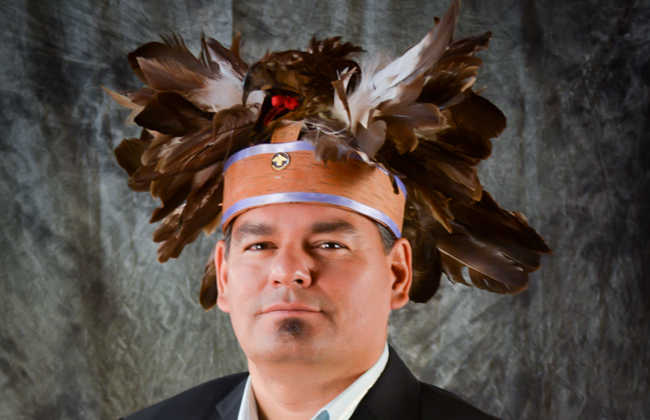RAT PORTAGE—Serpent River Chief Isadore Day was elected Ontario regional chief during the three-day Ontario Chiefs conference at Wauzhushk Onigum First Nation (Rat Portage, near Kenora). Chief Day garnered a strong mandate during the traditional Anishinaabe stand up election when 75 percent of the electors lined up behind him in support, securing him a first ballot victory.
“I feel pretty good about the road ahead,” said Chief Day, looking toward the future and the job he faces. “There are always going to be bumps, but we are ready to face those challenges.”
Among the challenges facing the Chiefs of Ontario is an 80 percent core funding cut by Indian and Northern Affairs Canada (INAC) that has gutted the organization and led to the layoffs of 10 staff.
Undaunted, Chief Day said that his first job will be one of political coordination amongst the Ontario First Nations, bringing together a united front to deal with the plethora of critical issues being faced by Ontario’s First Nations.
“People here are saying ‘what a difference a Day makes’,” quipped Anishinaabe Nation Grand Council Chief Pat Madahbee in congratulating the newly elected regional chief, before turning serious. “He listened to what the chiefs had to say and that was crucial to his campaign. I look forward to working with him in his new role and get to work as soon as possible.”
Chief Day listed his top priority in the election as being “securing a future for our children.”
Among his first declarations as regional chief, Chief Day spoke on the importance of this first post-Truth and Reconciliation Committee Report National Aboriginal Day and building a new relationship on social justice. “National Aboriginal Day is an opportunity to celebrate the amazing contributions that indigenous peoples have made to Canada and that young indigenous women and men are continuing to make today,” he said. “Following the recommendations of the Truth and Reconciliation Commission, today is also an occasion to reflect on how we move forward to create a new era of social justice and hope for Indigenous peoples.” Key to that approach will be the inclusion of First Nations youth in the formal political and social mechanisms in their communities and on the national stage.
The three pillars of the post TRC strategy that Chief Day intends to move forward are based on the judicial, social and political relationships between Ontario First Nations and Canada and Ontario. “What is going to underscore all of this is education,” he said. The issues which the TRC report were borne of education and from education will come the solutions. “Absolutely,” said Chief Day.
Chief Day said he felt that the Chiefs of Ontario as an organization should have anticipated the findings of the TRC and that has driven his own focus on building a post-TRC strategy for the organization and its members.
Chief Day’s opponents in the election for regional chief were Stoney and Kettle Point Chief Tom Bressette (a former vice regional chief) and Oneida Councillor Randall Phillips. Chief Day has been the chief of Serpent River for the past decade. He is also no stranger to representation in international, national and provincial forums, putting forward a firm resolve to address the issues facing aboriginal communities today.
“In 2006, Chief Isadore Day addressed President Bill Clinton at the Ontario Economic Summit and asked the president to reflect on his discussion from the vantage point of First Nations,” noted a release from Chief Madahbee’s office. “He was reciprocated with a lengthy input from the president. He has also been quite active with many other levels of leadership from the Prime Minister’s Office, the Ontario premier and scores of MPs – all focused on one thing: The First Nation Agenda. Chief Day is noted across the country as a visible and relevant leader.”




